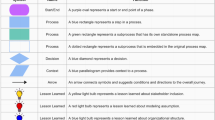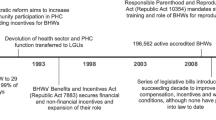Abstract
Participatory Design has mainly been practiced in Europe and North America. Our seven-year experience in Nigeria suggests that user participation is also a must in developing countries. However, the scope of participation needs to be expanded. For instance, in health informatics the communities served by the health facility in question need to be involved along with computer professionals and health providers. This paper presents the results of an experiment in tripartite partnership in systems design for Primary Health Care by designers, users/providers, and community representatives in Ile-Ife, Nigeria. The experience was extremely encouraging.
Similar content being viewed by others
References
Adejuyigbe, O., R.O.A. Makanjuola, E.O. Ogunbodede, A.A. Onayade, H.A. Soriyan and M. Korpela (1996): Health Informatics in Nigeria: The Way Forward. Abstract. In L. Hanmer and R. Salamon (eds.): HELINA’96: Second International Working Conference on Health Informatics in Africa, Proceedings. Cape Town: Medical Records Council, pp. 35-36.
Adejumobi, Said (1995): The Military and Local Government Autonomy: Some Reflections. In S. Adejumboli and A. Momoh. The Political Economy of Nigeria under Military Rule: 1984-1993. Harare: SAPES, pp. 282-296.
Adesigbin, R.K., A.Y. Orolakin, J.O. Folorunso, S.B. Fatunade, V.O. Elurele, A.O. Taiwo and O. Basorun (1993): Situation Analysis of Iremo Health District. Memorandum. Ile-Ife, Nigeria: OAUTHC.
Avgerou, C. and F. Land (1992): Examining the Appropriateness of Information Technology. In S.C. Bhatnagar and M. Odedra (eds.): Social Implications of Computers in Developing Countries, Proceedings. New Delhi: Tata McGraw-Hill, pp. 26-41.
Awotidebe, G.A. and H.O. Adesina (1993): Demographic and Environmental Situation of Ife Central Local Government: A Product of the Analysis of Clinic Master Cards. Ile-Ife, Nigeria: Adesoji Printing Press.
Bødker, Susanne (1996): Creating Conditions for Participation: Conflicts and Resources in Systems Development. Human-Computer Interaction, vol. 11, no.3, pp. 215-236.
Braa, Jørn (1996): Decentralisation, Primary Health Care and Information Technology in Developing Countries: Case studies from Mongolia and South Africa. In M. Odedra-Straub (ed.): Global Information Technology and Socio-Economic Development, Proceedings. Nashua: Ivy League, pp. 130-142.
Braa, Jørn and Arthur Heywood (1995): South Africa, Africa and Health Information Systems - The Need for a Reciprocal Collaboration. In M. Sosa-Iudicissa, J. Levett, S.H. Mandil and P.F. Beales (eds.): Health, Information Society and Developing Countries. Amsterdam: IOS Press, pp. 173-184.
Braa, Jørn and Eric Monteiro (1996): Infrastructure and Institutions - The Case of Public Health in Mongolia. In E.M. Roche and M.J. Blaine (eds.): Information Technology, Development and Policy: Theoretical Perspectives and Practical Challenges. Aldershot: Avebury, pp. 171-188.
Chambers, Robert (1992): Rural Appraisal: Rapid, Relaxed and Participatory. IDS Discussion Paper 311. Sussex: Institute of Development Studies, University of Sussex.
Daini, O.A., M. Korpela, J.O. Ojo and H.A. Soriyan (1992): The Computer in a Nigerian Teaching Hospital: First-Year Experiences. In K.C. Lun, P. Degoulet, T.E. Piemme and O. Rienhoff (eds.): MEDINFO 92, Proceedings. Amsterdam: Elsevier, pp. 230-235.
Federal Government of Nigeria (1996a): The National Health Policy and Strategy to Achieve Health for All Nigerians. Second edition, revised from the 1988 edition.Mimeo. Lagos: Federal Ministry of Health.
Federal Government of Nigeria (1996b): The National Health Plan. Mimeo. Lagos: Federal Ministry of Health.
Greenbaum, Joan (1993): A design of one’s own: Towards Participatory Design in the United States. In D. Schuler and A. Namioka (eds.): Participatory Design: Principles and Practices. Lawrence Erlbaum, pp. 27-37.
Korpela, Mikko (1994): Nigerian Practice in Computer Systems Development: A Multidisciplinary Theoretical Framework Applied to Health Informatics. TKO-A31. Espoo: Helsinki University of Technology.
Korpela, Mikko (1995): Who Will Implement Information Technology for Development? South African Computer Journal, vol. 15, pp. 20-25.
Korpela, Mikko (1996): Traditional Culture or Political Economy? On the Root Causes of Organisational Obstacles of IT in Developing Countries. Information Technology for Development, vol. 7, no.1, pp. 29-42.
Makanjuola, R.O.A., O.A. Daini, H.A. Soriyan and M. Korpela (1991): Low-cost Hospital Informatics in Africa: The Ile-Ife Experience. In K-P. Adlassnig, G. Grabner, S. Bengtsson and R. Hansen (eds.): Medical Informatics Europe, Proceedings. Berlin: Springer-Verlag, pp. 111-115.
Makanjuola, R.O.A., M. Korpela, H.A. Soriyan and M.A. Adekunle (1995): Making the Most of a Hospital Information System: A Nigerian Case. In M. Sosa-Iudicissa, J. Levett, S.H. Mandil and P.F. Beales (eds.): Health, Information Society and Developing Countries. Amsterdam: IOS Press, pp. 163-168.
Mandil, S.H., K. Moidu, M. Korpela, P. Byass and D. Forster (eds.) (1993): Health Informatics in Africa: HELINA 93, Proceedings. Amsterdam: Elsevier.
Miller, S.E. (1992): Political Implications of Participatory Design. In M.J. Muller, S. Kuhn and J.A. Meskill (eds.): PDC’ 92: Proceedings of the Participatory Design Conference. Palo Alto: CPSR, pp. 93-100.
Phillipson, David W. (1993): African Archaeology. Second Edition. Cambridge, UK: Cambridge University Press.
Soriyan, H.A. and B. Aina (1991):Women’s Work and Challenges of Computerization - the Nigerian Case. In I.V. Eriksson, B.A. Kitchenham and K.G. Tijdens (eds.): Women, Work and Computerization: Understanding and Overcoming Bias in Work and Education, Proceedings. Amsterdam: Elsevier, pp. 199-212.
Soriyan, H.A., A.D. Akinde, F.O. Farewo, M.A. Adekunle, A.O. Orisatoberu and M. Korpela (1996): M and Kernel as Appropriate Technology in Health Care in Africa. M Computing, vol. 4, no.1, pp. 15-19.
World Health Organisation (1979): Report of the International Conference held at Alma Ata, USSR, 6-12 September 1978. Health for All Series, vol. 1.
Author information
Authors and Affiliations
Rights and permissions
About this article
Cite this article
Korpela, M., Soriyan, H., Olufokunbi, K. et al. Community Participation in Health Informatics in Africa: An Experiment in Tripartite Partnership in Ile-Ife, Nigeria. Computer Supported Cooperative Work (CSCW) 7, 339–358 (1998). https://doi.org/10.1023/A:1008695307062
Issue Date:
DOI: https://doi.org/10.1023/A:1008695307062




